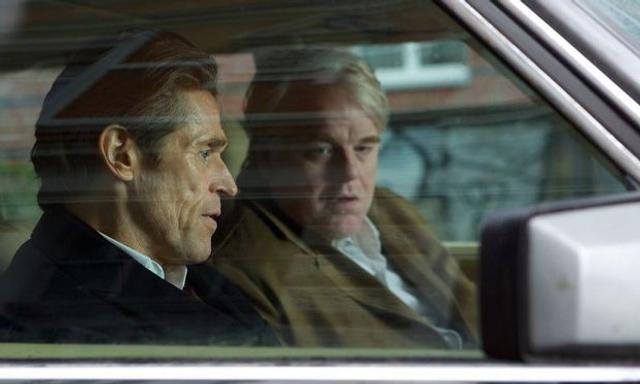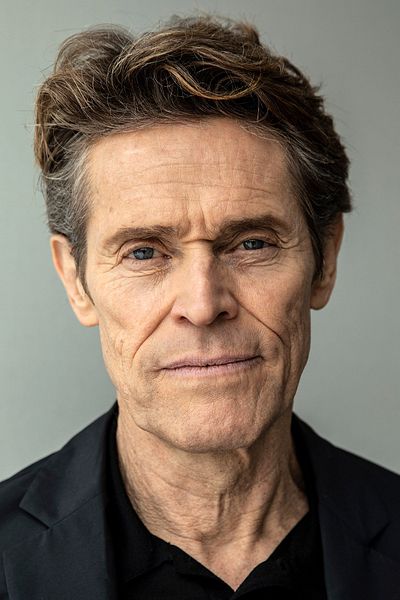One of the most recognisable faces in the movie business, Willem Dafoe has made a name for himself despite rarely staring as a big budget lead actor. His latest film, A Man Most Wanted, was set, and shot in Germany, about as far removed from the typical Hollywood lifestyle as possible.
Thankfully for us, and you, even such obscure films require the stars to talk to press, so we've been lucky enough to catch up with Willem, as he talked about the project, the director, and why he got his shirt off to get the part.
Q: I know you have a friendship with Anton Corbijn prior to shooting this film, can you talk about how you first met him?
A. Someone got in touch with me and said he wanted to shoot me. I was familiar with his work, so he came to the theatre I was working at and I remember this very tall, Dutch guy, and he said, let’s go for a walk. We went just around the corner, and he found a texture of an old building he liked very much, sort of as a backdrop and he said, could you get right here and take off your shirt? (laughs) And it was summer, very hot, and I said fine and he shot very quick and got a beautiful shot, and that was that.
Q: I grew up looking at his photos so of course the transition to film felt like it was the most natural thing for him. But did he bring his sparse aesthetic as a photographer to the direction of his films?
A. A little bit. I think he has a very strong aesthetic and a very strong sense of what he wants, it’s evident in how he worked on the movie. He’s very patient and waits for the subjects to reveal themselves. So when they do, he goes in for the kill and he’s very precise. He’s not like a technician that says we have to check this and cover this angle. If he had the moment where he felt like the scene was realized, in one shot he will move on. He works intuitively, yet he’s decisive and quite precise and I like that about him. It builds your confidence, when he knows he has it.
Q: That’s what I was going to ask because as an actor when you are working with somebody who has a clear vision in his head..
A. But he’s not specific immediately, it evolves with sitting with the material. But then once he sees it, there’s no clean up, he’s very precise.
Q: Then how do you bring what you bring to the table as an actor, do you have to be a very secure type of person to just take the word of your director?
A. I think so. But he is also very appreciative and very respectful of actors and really gives them whatever they need. He’s very generous that way. Personality wise, he’s very reserved, quite sensitive, so I see him indulge actors’ comfort zones very much, at least in preparation of the material. And then once you are actually in movement doing the scene, he’s very clear and quite strong.
Q: Did you read the book prior to working on this film?
A. Well, John le Carré of course I knew many of the movies that were made of his novels. I tend to read non-fiction so it’s not like I know all of his work, but I like him as a writer very much. Probably the best TV I ever saw was ‘Smiley’s People’ and ‘Tinker, Tailor, Soldier, Spy’, that was beautiful.
Q: Watching it I realized how the spy game has changed post 9/11, what did you learn after working on this film?
A. I want to say I learned about Hamburg, how English it is, what a wealthy place it is and how it’s been a place for money to get handled and invested. So I think I learned a bit about the banking world. As far as Phillip (Seymour Hoffman’s) character functioning in a post-9/11 world, they see someone that comes on their radar, they watch them, and the biggest tension in the story besides how everyone relates to each other is at what time you pounce? Do you let him go deep enough in to whatever he’s going to do to catch him red handed, or do you protect things and intervene before he acts.
Q: When you knew that you were playing Tommy Brue, did you have anybody in mind?
A. Yes. Because the world is a weird world of accents and different social classes, I wanted to find someone who was very close to Tommy for the accents, so I had him read all the dialogue and I basically copied his. A guy like him, he’s English, or Scottish perhaps, but he’s lived abroad for many years, so his English is not typical, it’s going to have a flavor. So that was important to me.,
Q: And please correct me, but I felt like when we first see you in this film, he’s so composed and well dressed with this air, but as the film progresses, your body language changes completely. Is that how you played it?
A. Yeah, he’s very powerful, really the head of this very successful bank, but then you see this little glimpse of the wizard behind the curtain and you see all of his problems. Personally with the Rachel McAdams character, it brings up a great amount of guilt, and his life isn’t working, even though he has a very privileged life. We shot some scenes about his daughter, with how it relates to the Rachel McAdams character, which didn’t make the cut, and I think that’s fine because it shaped how you play it. You start to feel the connections, and you put one scene next to another and you start to see how they relate.
Q: Did also shooting in a foreign city add to everyone’s performance?
A. I can’t imagine this could have been done in another place. It really needed that sense of place to give the film authority. Hamburg colors so many things, from the costumes to the accents, to the architecture; all those things play into it. Hamburg is a very particular place and the novel is written very specifically for Hamburg.
Q: To work on a film where the acting is so wonderful, were there any scenes that you appreciated the most, or were kind of looking forward to on the day of?
A. I really didn’t make those distinctions, because all of the partners in the scenes, I was happy to work with. And sometimes it’s funny you know, sometimes I was excited to see my office, and it was a very beautiful building, a very particular building. I was excited for the brief scenes at my house and I was excited to work with both Rachel and Phil.
Q: Have you worked with either of them before?
A. No. And I had seen Phillip through the years, and I certainly admired him, but didn’t really know him personally. Even though we lived in the same neighbourhood, had many common friends and both worked in theater, we had never really crossed paths.
Q: On paper, it could be a recipe for disaster when you have so many great actors kind of meeting up in one space in a foreign city, did it even surprise you how Anton curated the best possible group of actors for the film?
A. I think so. It was really an international cast, so no one is on their home turf. Even the German actors, though they are filming in Germany, they are filming in English with some Hollywood elements in it. Me, I am used to that, I film all kinds of movies, so I feel comfortable in that. But I think when the identity of a film is mixed, meaning it comes from an English company, with German partners, a Dutch director, a lot of German actors, an Iranian actor, and other countries, everybody doesn’t think about their position and they just do the work. So everybody is very cooperative and happy to be there.
Q: Productions like this don’t happen often, so I am just wondering, because you have been working for a long time, do you feel that films are turning into a much more international production or maybe this case is a rarity?
A. I don’t know, I have shot a lot internationally, even in American movies. I think I am attracted to that. So your question is a good question, but because I like those kinds of situations, I can’t tell. I am too close to it. I hope so though. For example, I love watching movies where I don’t know who is dating whom or how much they make or whether they are considered a good actor or a bad actor.
Q: Because you have worked with many directors a couple of times (Wes Anderson, Lars Von Trier) are you now part of the Anton posse?
A. That’s up to him. I had a good time with him and I am always happy to see him and yeah, I would definitely work with him again. His way of working, he’s an artist and when you work, you like to be in the company of people that inspire you and challenge you. It’s as simple as that, and he does and I think this is a good movie, so I would go there again, definitely.
A Most Wanted Man releases in Irish cinemas from September 12th.




















































































